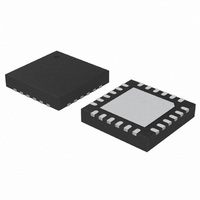C8051F988-GM Silicon Laboratories Inc, C8051F988-GM Datasheet - Page 157

C8051F988-GM
Manufacturer Part Number
C8051F988-GM
Description
IC MCU 8BIT 4KB FLASH 24QFN
Manufacturer
Silicon Laboratories Inc
Series
C8051F9xxr
Specifications of C8051F988-GM
Program Memory Type
FLASH
Program Memory Size
4KB (4K x 8)
Package / Case
24-UQFN Exposed Pad, 24-HUQFN
Core Processor
8051
Core Size
8-Bit
Speed
25MHz
Connectivity
SMBus (2-Wire/I²C), SPI, UART/USART
Peripherals
Brown-out Detect/Reset, POR, PWM, Temp Sensor, WDT
Number Of I /o
17
Ram Size
512 x 8
Voltage - Supply (vcc/vdd)
1.8 V ~ 3.6 V
Data Converters
A/D 10x10b
Oscillator Type
Internal
Operating Temperature
-40°C ~ 85°C
Processor Series
C8051F9x
Core
8051
Data Ram Size
512 B
Interface Type
I2C, SMBus, Enhanced UART, Enhanced SPI
Maximum Clock Frequency
7 KHz
Number Of Programmable I/os
17
Number Of Timers
4
Operating Supply Voltage
2.4 V
Maximum Operating Temperature
+ 85 C
Mounting Style
SMD/SMT
3rd Party Development Tools
PK51, CA51, A51, ULINK2
Development Tools By Supplier
C8051F996DK
Minimum Operating Temperature
- 40 C
On-chip Adc
10 bit, 10 Channel
On-chip Dac
10 bit, 4 Channel
Lead Free Status / RoHS Status
Lead free / RoHS Compliant
Eeprom Size
-
Lead Free Status / Rohs Status
Lead free / RoHS Compliant
Other names
336-1959-5
- Current page: 157 of 322
- Download datasheet (3Mb)
14.6. Minimizing Flash Read Current
The Flash memory in the C8051F99x-C8051F98x devices is responsible for a substantial portion of the
total digital supply current when the device is executing code. Below are suggestions to minimize Flash
read current.
1. Use idle, suspend, or sleep modes while waiting for an interrupt, rather than polling the interrupt flag.
2. C8051F99x-C8051F98x devices have a one-shot timer that saves power when operating at system
3. Flash read current depends on the number of address lines that toggle between sequential Flash read
Idle Mode is particularly well-suited for use in implementing short pauses, since the wake-up time is no
more than three system clock cycles. See the Power Management chapter for details on the various
low-power operating modes.
clock frequencies of 14 MHz or less. The one-shot timer generates a minimum-duration enable signal
for the Flash sense amps on each clock cycle in which the Flash memory is accessed. This allows the
Flash to remain in a low power state for the remainder of the long clock cycle.
At clock frequencies above 14 MHz, the system clock cycle becomes short enough that the one-shot
timer no longer provides a power benefit. Disabling the one-shot timer at higher frequencies reduces
power consumption. The one-shot is enabled by default, and it can be disabled (bypassed) by setting
the BYPASS bit (FLSCL.6) to logic 1. To re-enable the one-shot, clear the BYPASS bit to logic 0.
operations. In most cases, the difference in power is relatively small (on the order of 5%).
The Flash memory is organized in rows of 64 bytes. A substantial current increase can be detected
when the read address jumps from one row in the Flash memory to another. Consider a 3-cycle loop
(e.g., SJMP $, or while(1);) which straddles a Flash row boundary. The Flash address jumps from one
row to another on two of every three clock cycles. This can result in a current increase of up 30% when
compared to the same 3-cycle loop contained entirely within a single row.
To minimize the power consumption of small loops, it is best to locate them within a single row, if
possible. To check if a loop is contained within a Flash row, divide the starting address of the first
instruction in the loop by 64. If the remainder (result of modulo operation) plus the length of the loop is
less than 63, then the loop fits inside a single Flash row. Otherwise, the loop will be straddling two
adjacent Flash rows. If a loop executes in 20 or more clock cycles, then the transitions from one row to
another will occur on relatively few clock cycles, and any resulting increase in operating current will be
negligible.
Rev. 1.0
C8051F99x-C8051F98x
157
Related parts for C8051F988-GM
Image
Part Number
Description
Manufacturer
Datasheet
Request
R
Part Number:
Description:
SMD/C°/SINGLE-ENDED OUTPUT SILICON OSCILLATOR
Manufacturer:
Silicon Laboratories Inc
Part Number:
Description:
Manufacturer:
Silicon Laboratories Inc
Datasheet:
Part Number:
Description:
N/A N/A/SI4010 AES KEYFOB DEMO WITH LCD RX
Manufacturer:
Silicon Laboratories Inc
Datasheet:
Part Number:
Description:
N/A N/A/SI4010 SIMPLIFIED KEY FOB DEMO WITH LED RX
Manufacturer:
Silicon Laboratories Inc
Datasheet:
Part Number:
Description:
N/A/-40 TO 85 OC/EZLINK MODULE; F930/4432 HIGH BAND (REV E/B1)
Manufacturer:
Silicon Laboratories Inc
Part Number:
Description:
EZLink Module; F930/4432 Low Band (rev e/B1)
Manufacturer:
Silicon Laboratories Inc
Part Number:
Description:
I°/4460 10 DBM RADIO TEST CARD 434 MHZ
Manufacturer:
Silicon Laboratories Inc
Part Number:
Description:
I°/4461 14 DBM RADIO TEST CARD 868 MHZ
Manufacturer:
Silicon Laboratories Inc
Part Number:
Description:
I°/4463 20 DBM RFSWITCH RADIO TEST CARD 460 MHZ
Manufacturer:
Silicon Laboratories Inc
Part Number:
Description:
I°/4463 20 DBM RADIO TEST CARD 868 MHZ
Manufacturer:
Silicon Laboratories Inc
Part Number:
Description:
I°/4463 27 DBM RADIO TEST CARD 868 MHZ
Manufacturer:
Silicon Laboratories Inc
Part Number:
Description:
I°/4463 SKYWORKS 30 DBM RADIO TEST CARD 915 MHZ
Manufacturer:
Silicon Laboratories Inc
Part Number:
Description:
N/A N/A/-40 TO 85 OC/4463 RFMD 30 DBM RADIO TEST CARD 915 MHZ
Manufacturer:
Silicon Laboratories Inc
Part Number:
Description:
I°/4463 20 DBM RADIO TEST CARD 169 MHZ
Manufacturer:
Silicon Laboratories Inc










